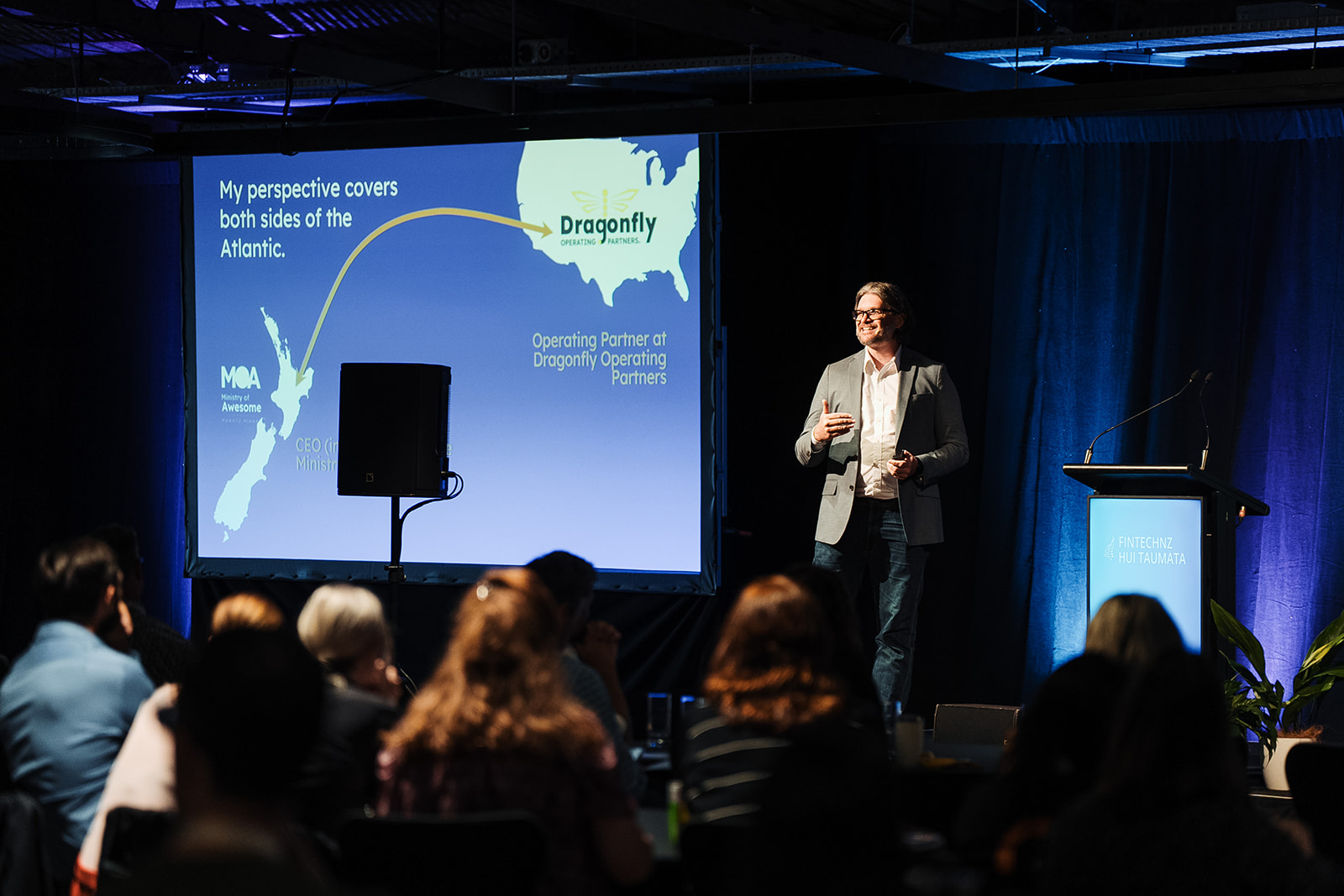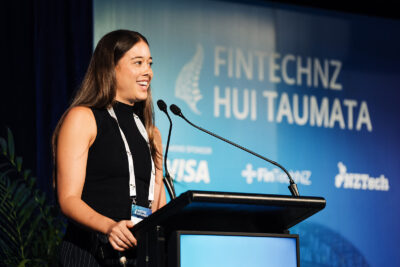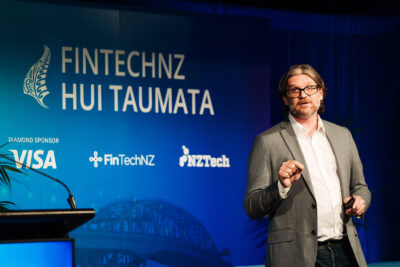Fintech’s Bold Future: ANZ’s Reflections from Hui Taumata 2025
What a fantastic Hui that goes from strength to strength. Last year we reflected on…

The recent FinTech Hui Taumata featured a series of compelling quickfire sessions that delivered concentrated wisdom on open banking, venture investment, AI innovation, and disruptive fintech trends. These rapid-fire presentations provided attendees with actionable insights and forward-looking perspectives on the evolving fintech landscape in New Zealand and beyond.
Coco Armstrong, Regulatory Strategy & Operations Lead at Fiskil, shared valuable lessons from Australia’s open banking implementation that offer a roadmap for New Zealand’s journey.
Lead at Fiskil, shared valuable lessons from Australia’s open banking implementation that offer a roadmap for New Zealand’s journey.
Payment applications currently dominate open banking use cases, but Armstrong highlighted energy as the next major sector poised for disruption. This presents a strategic opportunity for forward-thinking New Zealand fintechs to develop solutions ahead of the curve.
A key competitive advantage for New Zealand lies in its regulatory approach, which enables businesses to leverage enriched data more effectively than in some other markets. Armstrong emphasised that the future belongs to an open data economy—and New Zealand can position itself at the forefront by taking action now.
For businesses looking to capitalise on these opportunities, Armstrong recommended three practical steps: integrate early, prioritise exceptional customer experiences, and begin testing APIs while establishing partnerships with intermediaries without delay.
Nick Frandsen, Co-Founder and CEO of Paloma, challenged conventional thinking about startup funding with three counterintuitive lessons from Australasia’s leading venture studio.
challenged conventional thinking about startup funding with three counterintuitive lessons from Australasia’s leading venture studio.
Contrary to popular belief, Frandsen argued that starting with modest funding (around $2 million) often yields better results than securing massive initial investments. Larger funding rounds bring heightened expectations and complexity that can hamper a startup’s agility and focus during crucial early stages.
Frandsen’s stark advice to “plan as if you’re in the Squid Game” reinforced the unforgiving nature of startup development. Unlike corporate environments where multiple failures might be tolerated, startups often don’t get second chances if early product versions miss the mark. This reality demands crystal-clear milestones and relentless execution.
Perhaps most significantly, Frandsen highlighted AI’s transformative impact on startup trajectories. Today’s AI-powered startups are scaling with unprecedented speed through enhanced product development, leaner operations, and highly efficient go-to-market strategies.
Sulabh Sharma, Co-founder of Debut NZ, delivered a compelling session on how artificial intelligence is fundamentally transforming banking by placing people at the centre of financial services.
compelling session on how artificial intelligence is fundamentally transforming banking by placing people at the centre of financial services.
Sharma explored the rapidly evolving landscape of AI-enhanced customer experiences in banking, highlighting the delicate balance between automation efficiency and maintaining human-centric financial services. His presentation demonstrated how AI technologies are enabling a paradigm shift from reactive to proactive banking—where financial institutions don’t merely respond to customer needs but actively anticipate them, delivering personalised solutions in real time.
“AI is enabling a shift from reactive to proactive banking—where financial services don’t just respond to customer needs but anticipate them, offering personalised solutions in real-time,” Sharma noted, emphasising that this predictive capability represents one of the most significant transformations in banking history.
The session prompted important questions about how fintech companies can ensure that innovation remains genuinely customer-first even as AI capabilities accelerate. Sharma suggested that successful implementation requires not just technical expertise but a deep understanding of human financial behaviours and needs—a perspective that resonated strongly with the Hui’s focus on bold, people-centred innovation.
James Burnes, CEO of Ministry of Awesome, offered a global perspective on fintech innovation opportunities with particular relevance to New Zealand.
global perspective on fintech innovation opportunities with particular relevance to New Zealand.
WealthTech is experiencing remarkable growth in the US, particularly among younger demographics comfortable with algorithm-driven investment advice. Meanwhile, New Zealand’s stable regulatory environment provides a competitive advantage in sustainability and environmental, social, and governance (ESG) finance—areas experiencing temporary slowdowns in more volatile overseas markets.
The Buy Now, Pay Later (BNPL) sector continues its explosive growth trajectory, with projections suggesting 900 million users by the end of 2026. Burnes emphasised that successful BNPL solutions must be fully integrated into the purchase decision process rather than appearing only at checkout.
Burnes also noted the fundamental shift in consumer attitudes toward financial services providers. As traditional banking roles evolve, opportunities emerge for fintechs to create solutions previously offered exclusively by banks or insurers.
Finally, Burnes addressed AI’s profound impact on work itself, challenging attendees to consider how they might create tools that redefine their own roles—or develop skills for the new positions that AI will inevitably create.
James’ key advice for Aotearoa’s start-up ecosystem was confronting: “stop being so nice.” He challenged the audience not to hold back when it comes to sharing honest feedback with founders if their solutions need more work. He explained that being supportive isn’t enough, if we want our founders to succeed globally, they need access to the expertise and insights that will help them shape their tech solutions for success—you do them no favours by holding back.
These quickfire sessions exemplified the bold, forward-thinking spirit of the NZ fintech community, offering attendees of the Hui practical insights to navigate the watershed moment facing Aotearoa’s fintech sector.
What a fantastic Hui that goes from strength to strength. Last year we reflected on…
At the FinTechNZ Hui Taumata 2025, Anthony Jones, Head of Consumer Solutions at Visa, shared…
The recent FinTech Hui Taumata featured a series of compelling quickfire sessions that delivered concentrated…